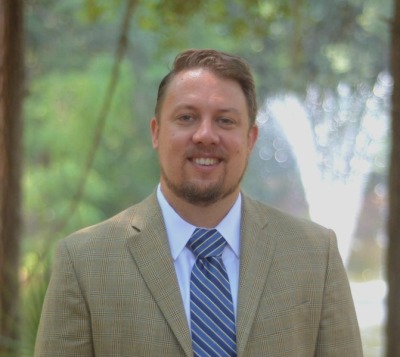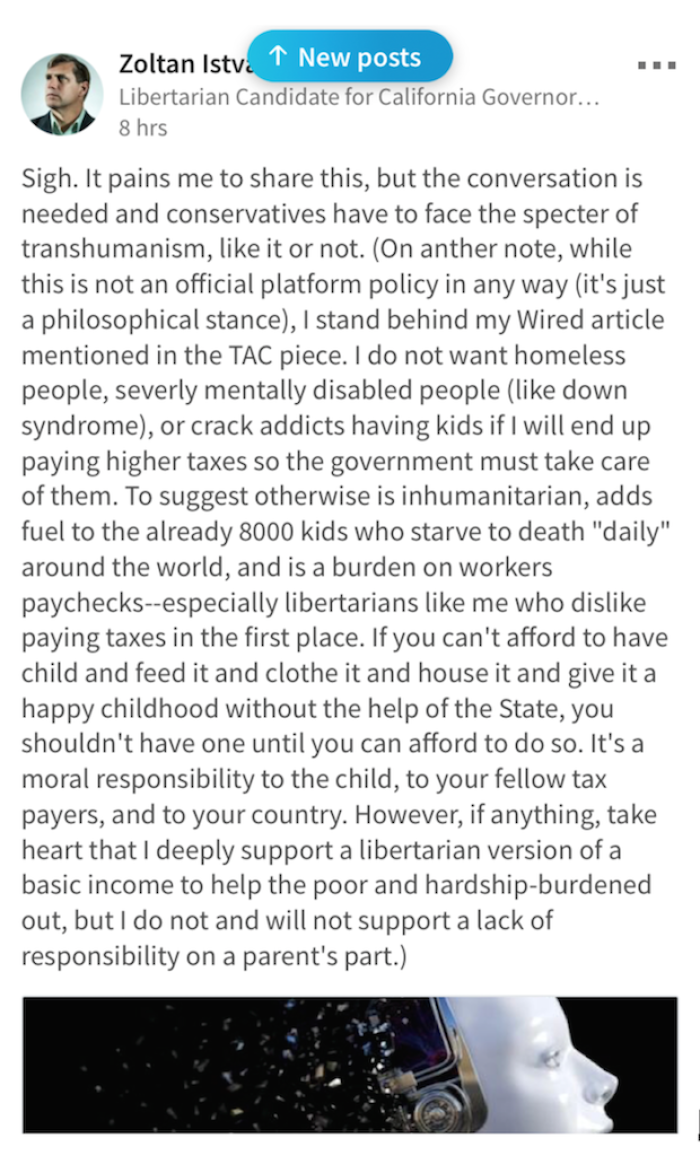Christian Transhumanism Offers an Ethical Transhumanist Alternative

If you have read the The American Conservative's (TAC) recent postings about the evolving transhumanist movement, you have likely developed reasonable concerns. People should be dismayed at Zoltan Istvan's misguided article in TAC from two weeks ago entitled: "The Growing World of Libertarian Transhumanism." And, if one believes that Istvan's transhumanism represents all transhumanists, then Kai Weiss' follow-up piece "Transhumanism is Not Libertarian, It's an Abomination," is correct and appropriately titled. But these two depictions do not represent the majority of transhumanist thought. As such I would request: Please folks do not throw the transhumanist-baby out with Zoltan Istvan's bathwater. There is an ethical transhumanist alternative: Christian Transhumanism.
The reason for my plea is that neither Istvan's nor Weiss' depiction of transhumanism is fully accurate. That is because there is actually a philosophical and theological debate happening within transhumanism as to how the movement should practically proceed. This point of conversation is a place where Christians can make a positive moral impact.
To be clear, transhumanism at its core is not some sci-fi or superhero, this will happen in 100 years, concept. Transhumanism is happening right now. As a pastor serving a local congregation, I see proof of transhumanism in my congregation everyday.
Congregants come to church with upgraded hips and knees. They have pacemakers surgically installed. Some even combat their substandard vision via Lasik Eye Surgery to enhance their vision to 20/15, better than perfect, vision. Transhumanism is here. Humanity is evolving beyond its current limitations by way of exponentially increasing advances in science and technology. As a matter of fact, transhumanism is so far along technologically that the famed entrepreneur, Elon Musk, is funding a team of people working on developing functional neural-lace to improve human cognition right now.
Moreover, I think it's important to caution folks not to get too far down the "transhumanism is all bad" road. I say this because holding an overly dogmatic position in a quickly developing technological movement is likely to leave one looking hypocritical in the long run. Case in point: If scientists figure out a way to affordably use CRISPR technology to edit the human genome to eliminate the possibility of getting cancer — no one is reasonably going to reject that technological advancement.
That being said, all humans should be worried about Istvan's misguided ethic becoming mainstream. We should desire an alternative path for technological advancements that pertain to human enhancement. It doesn't take much observation of his collective work to realize that, philosophically; he's been formed right out of the utilitarian Peter Singer mold. Just look at his recent Twitter post (which he later edited) that followed Weiss' piece being published. It proves the point.

As the tweet shows clearly, not a lot of investigative prowess is required to discover that Istvan knows little about libertarianism in a conservative context. Mr. Weiss points this out well in his aforementioned article. The unfortunate misstep that Weiss makes in his article, that admittedly provides all the right "I'm on the team" quotes from Acton to Weaver, is to unilaterally assume that other transhumanists aren't concerned with Istvan's abominable ethic. That simply isn't true. Many transhumanists are very concerned.
For example in March of 2014 I wrote a piece for Humanity+ Magazine entitled "Religion+ for Humanity+" where I tackled Istvan's article "I'm an Atheist, Therefore I'm a Transhumanist" head on. Following that article, Istvan launched a publicity stunt of running for President of the United States under a self-manufactured political party in order to advance his personal transhumanist agenda. As a response in June of 2015, I published another piece in the Christian Post entitled "A Vote for the Transhumanist Party Presidential Candidate is a Vote for Tyranny."
The fallout from my CP article led to several folks reconsidering Istvan's intentions. Ultimately, a couple of his campaign officers resigned from aiding in his political efforts. Following these resignations, some of the most prominent transhumanists globally — both secular and religious — started a petition entitled: Transhumanists Disavow Zoltan Istvan Candidacy for US Presidency).
I share this information because it leads to an important detail that Christians need to consider as they discern if they should get involved with the growing transhumanist movement. It is a fact that stands in direct opposition to Mr. Weiss' contention that transhumanism is a Godless movement. That consideration is the relatively recent rise of the Christian Transhumanist Association that I helped actualize in 2014 with Executive Director Micah Redding.
To date the CTA has over 755 members and 2000 likes and follows on the Christian Transhumanist Association Facebook Group Page. Just this past June of 2017, the CTA formalized the addition of a 7 member Academic Advisory Council made up of renowned academics with the intent of establishing "a center of positive engagement at the intersection of Christianity, Transhumanism, and the academic world." It appears that, every single day, the CTA's numbers and influence are on the rise.
All this to say that — while Istvan continues to run around sensationalizing transhumanism in an attempt to capitalize on the attention of being a futurist shock-jock — Christians have the opportunity to radically influence the direction that transhumanism takes in the future. Morally guided, community discerned, Christian Transhumanism offers a legitimate alternative to utilitarian, atheistic transhumanism. Per TAC's coverage, failing to consider this transhumanist option is not only a disservice to upholding liberty and freedom of true choice but it is also an affront to the traditional social institutions that have formational leadership to help lead individuals and nations into the redemptive technological future.





























